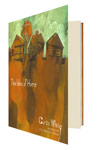
White starts his novel by pulling a Magritte. “This Is Not an Autobiographical Statement” is the first chapter of what otherwise seems to be the autobiographical statement of a man named Curtis White, focusing specifically on his “hometown,” a suburban no-place called San Lorenzo.
We expect autobiographical fiction to come from some sort of childhood trauma—you’re upset about your crummy life, and writing a book is cheaper than therapy—but the narrator of The Idea of Home seems upset that his childhood wasn’t traumatic enough. Sterile San Lorenzo denied him the sex and death and filth a growing boy needs, and so he’s had to go back and make it all up. The first sentence of the second chapter, “Boy Finds Body”: “I never found a body when I was a boy”; he then goes on to tell us about the time he found a body when he was a boy. Each chapter is an anecdote or series of anecdotes—personal, historical, fictional—that at some point lurches into a grotesque fantasy, filthier and nastier but somehow more honest than the facts on the ground level of contemporary suburbia. A factual, if somewhat wry, portrait of South Vietnam’s “Dragon Lady” Madame Nhu warps into the story of a boy who buys a miniature, naked, caged Madame Nhu for $37.95 on the street and takes her home as a pet. And it’s uglier than it sounds.
I wish I could avoid using the P-word here. Whos ever benefited from the comparison? But between the Lot 49-style NoCal geography and these Gravity’s Rainbow-style phantasmagorias, I really can’t get around it: Pynchonesque. I am going to admit that The Idea of Home is pleasingly Pynchonesque.
That’s not to say that White’s sentences always enjoy a Pynchonesque felicity. Sometimes his prose smells more like the pages of a hip glossy magazine than those of an avant-garde novel:
Do you remember Miss Nancy on Romper Room, how she was able to see us all on the other end of the television waves through her Magic Mirror?… Of course, our television screen, too, was a magic mirror where I was he as you were he and we were all together.
Ouch! He was on a roll, and then, clunk, that Beatles reference. And the very end of the novel (“Paris, 1873”) seems less a realization of narrative/metanarrative...
You have reached your article limit
Sign up for a digital subscription and continue reading all new issues, plus our entire archives, for just $1.50/month.
Already a subscriber? Sign in





